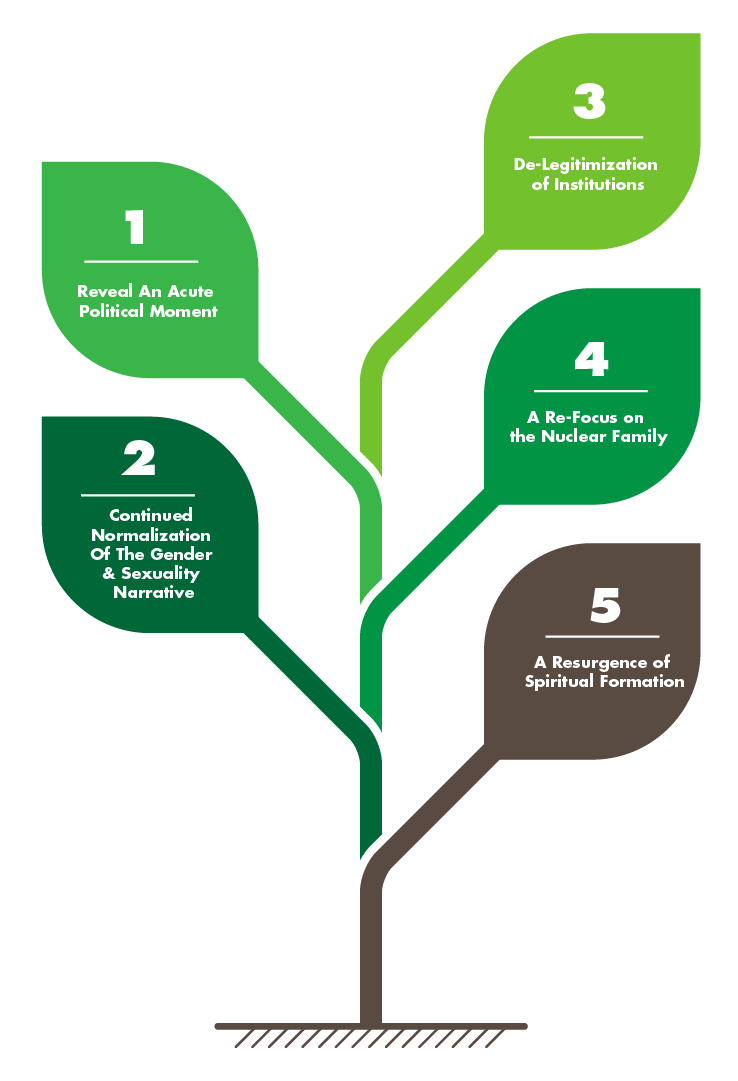Courageous Resilience in 2024

2024 is barely a month old but it feels like this weather report. People are making predictions about the stock market and the presidential election—they are estimating the amount of impending snow coming along with its ramifications. Will it be one inch or will there be a cultural avalanche? We don’t know. One thing I can predict with certainty—snow is likely coming this year so it is best to prepare for the coming storm.
The Underground Sessions seeks to accomplish two goals: equip the saints and engage the skeptics.
This entry is the first in a series of articles I will write this year for our Underground Sessions (U.S.) newsletters. For those not familiar with U.S., it is the cultural engagement and apologetics ministry arm of MBC. Our events and resources seek to accomplish two goals: (1) First, we want to equip the saints for the work of ministry—particularly in the area of Christian worldview training. (2) Second, we want to engage the skeptic with the Gospel of Jesus Christ. At Underground, we specifically attempt to find cultural touchpoints for spiritual discussion. Recently, the term cultural apologetics has been in vogue. It is exactly what we seek to do at the U.S. If want to know more about cultural apologetics, check out Paul Gould’s BOOK with the same title, or the newly minted Keller Center for Cultural Apologetics.
Resolved: 2024 will be a year of courageous resilience for Christians.

I’ll suggest one.
Resolved: 2024 will be a year of courageous resilience for Christians.

2024: A Year (Requiring) Courageous Resilience
What do I mean by courageous resilience? To have courage means we are willing to say and do what is right in the face of opposition and suffering. What’s interesting is that there is, currently, an intramural debate happening in the evangelical world regarding courageous cultural engagement. This has been called, tongue in cheek, the “winsome wars.”
To have courage means we are willing to say and do what is right in the face of opposition and suffering.
On the one hand, many will argue that our witness should be more winsome. In other words, our style should be charming and attractive to the outside world. We should win people with kindness and sound reasoning. The downside is this approach can create a tendency toward accommodation of secular cultural narratives under the guise of “mission.” This approach lacks, at times, the prophetic truth that a lost world needs to hear. It jettisons courageous truth telling and prioritizes “respect” from cultural elites for the purpose of garnering a seat at the table. Carl Trueman recently wrote an article at First Things highlighting the danger of this approach.
On the other hand, there are some who argue that, because of our cultural moment, winsome apologetics is not as effective as it once was. Today, we need to be more prophetically confrontational. We need to understand the world will hate us for what we believe. However, this should not keep us from sharing the truth. Author Aaron Ren has outlined the argument well in an article he titled, “The Three Worlds.” In summary, he outlines the positive, neutral and negative worlds (along with time periods). Since 2014, he argues, we have been living in the negative world, where true Biblical Christian faith does not have cultural swaying power. Thus, we should take Jesus words in John 15:18-19 very seriously:
If the world hates you, know that it has hated me before it hated you. If you were of the world, the world would love you as its own; but because you are not of the world, but I chose you out of the world, therefore the world hates you.

In fact, many Christians, and influential Christian leaders, are arguing just the opposite: our missional effectiveness is attuned to the secular world respecting us. To be blunt, this seems the opposite of what Jesus himself says.
Why do I raise this point? Precisely because this is the current debate surrounding cultural engagement. Should we be more winsome? Or should we be more prophetic? Of course, one can argue that you need both. I think that is true. You need both TRUTH and GRACE, which Jesus himself embodies (John 1:14). Jesus met the woman at the well in John 4 with loving truth, but he also turned over tables at the temple (Matthew 21:12-13). Both approaches, unless you are the Son of God, require true courage.
When we are courageous, there will be consequences. People will push back. As such, we must be resilient to weather the storm. No matter the snowfall totals, we plow forward in faithful obedience to Scripture. We follow the God who reveals himself in those Scriptures.
<..... Post Break…….>
Five Trends To Watch
Now, let’s get practical about the snowfall predictions. What should we be watching out for in 2024? I’ll do my best to make some predictions. At the end of the year, we can assess how well I did. Each of these points has significant worldview implications. I will then offer a rubric for responding well.

Secularism is on the rise and because Millennials and Gen Z are affiliating less with organized religion, they are replacing it with political engagement (at least on certain causes they care about). The result: politics is now a religion. Trump v. Biden, then, is a battle between two saviors, not a debate over ideas and policies.
2. 2024 Will See A Continued Normalization Of The Gender And Sexuality Narrative: This issue has steadily grown in influence and acceptance over the last 10-15 years. June has become a holy month on the secular calendar. Last year was the first time I said, “We are not going to Target in June.” A few years ago, a San Francisco choir “jokingly” sang that they were “coming for our children.” The goal? Normalize the gender and sexuality narrative at the youngest ages. Except they were serious! Now, nearly every cultural institution is mirroring the same message: entertainment (even Disney!), the military, medicine, education, and yes, a growing number of churches. The recent conference from Andy Stanley and announcement from the Vatican are evidence of this reality. As a result, if you disagree, it will require courageous reliance to stay true to the Gospel.
3. 2024 Will Bring Continued De-Legitimization of Institutions. Yuval Levin wrote a wonderful book a few years ago entitled, “A Time To Build.” In the volume, he argued that, for a society to flourish, it must build strong institutions promoting civic and relational connectedness. The problem is people have no allegiance to institutions anymore. Case in point: many people in Congress do not appear interested primarily in serving the country. Rather, they want to get famous by building their social media platforms (Obvious examples are Alexandria Ocasio Cortez on the left, and Lauren Boebert on the right). No wonder Congress has an abysmal approval rating. However, it does not stop with government. Media, medicine, and even churches have all taken a hit in recent years. The COVID pandemic put the CDC, NIH, and WHO on the hot seat—and they are still are to this day. The average person feels that no one is telling the truth. Election integrity will be a big issue this year and it will be interesting to see how people respond to the outcome.
4. 2024 Will Cause A Re-Focus on the Nuclear Family: As a result of my first three predictions, I am hopeful these last two will bear positive fruit. Parental rights became a lightning rod issue in the Virginia Gubernatorial election. Beware infringing upon parent’s rights to raise their own children! This has facilitated an exponential rise in homeschooling. Expect this trend to continue as more and more people don’t trust outside influences with the youngest among us. I also expect to see the rise of alternative media choices driven by this re-focus on the nuclear family.

“The bottom line: we need to know what we believe, be able to articulate and defend what we believe, and be confident in our identity in Christ. We need to be resilient. Then you go into battle.”
<..... Post Break…….>
A Response Rubric for 2024
While these trends are not exhaustive, I expect them to be accurate. Still, the question remains, in light of these snow fall predictions, how do we respond? How do mature Christians, ready for battle with the forces of darkness, prepare for the secular age we live in? Happily, the Apostle Peter wrote a letter with this goal in mind. Peter expounds a message to Christians and churches under persecution (Far greater than ours!) during the first century. He writes to cultural exiles. How does Peter exhort the believers? He provides a response rubric in 1 Peter 4:7-11:
“The end of all things is at hand; therefore be self-controlled and sober-minded for the sake of your prayers. Above all, keep loving one another earnestly, since love covers a multitude of sins. Show hospitality to one another without grumbling. As each has received a gift, use it to serve one another, as good stewards of God’s varied grace: whoever speaks, as one who speaks oracles of God; whoever serves, as one who serves by the strength that God supplies—in order that in everything God may be glorified through Jesus Christ.”
The end of all things is at hand. Come quickly, Lord Jesus! Until he does, Peter offers a rubric for navigating 2024 in America. In this moment, we are “stewards of God’s grace.” I believe Peters shows us a rubric for navigating our times, which I will call “The Five C’s of Cultural Engagement.”
First, CLARITY. Peter says we need to be “self-controlled and sober-minded.” In other words, you need to think clearly about the issues. You need to see them rightly in light of God’s Word and the Gospel. Too often we become distracted and enticed by the world’s offering and systems. Don’t fall for the wisdom of the world—pursue the wisdom from above (James 3)! When you are thinking clearly, you will also speak clearly and with conviction to those in your orbit. Where do you need clarity for 2024?
Second, CULTURE. This one may seem obvious. If you are doing cultural engagement, you need to think about culture! However, we live in a visual, narrative culture where messages are often passively received rather than critically evaluated. Every show you watch, every song you listen to, every advertisement you see and, increasingly, every post you receive on social media has an agenda. They have message. They are trying to capture your heart. The way to combat this is to know the end of the true story. Jesus wins. Jesus will come back. The “end of all things is at hand,” so do not settle for the lies of the moment. Know the culture and expose the idols that have gripped our hearts. Daniel Strange wrote a wonderful book entitled, Plugged In, which can teach you how to do this.
We live in a visual narrative culture where messages are often passively received rather than critically evaluated. Every show you watch, every song you listen to, every advertisement you see and, increasingly, every post you receive on social media has an agenda. They have message. They are trying to capture your heart. The way to combat this is to know the end of the true story. Jesus wins. Jesus will come back. The “end of all things is at hand,” so do not settle for the lies of the moment.
Third, CREED. Throughout church history, theologians and church leaders have gathered to make a statement of belief. Pastor Dave Hentschel famously said, “you have to dig into a creed.” A creed is a statement of what we believe. They are filled with theology. They were passed down for teaching the next generation the truth about Jesus. When you are engaging the culture, you need to know what you believe. The Apostles Creed begins this way, “I believe in God the Father Almighty, maker of heaven and earth and in Jesus Christ His only Son our Lord […]” Think about the theological truths that are packed in that statement alone. A secular person might say, “How can you believe God made the world? That’s ridiculous!” How would you respond? To be a “steward of God’s varied grace” is to be someone who shares the Gospel, with love and clarity.
Fourth, COUNSEL. This point is something desperately needed in today’s world. People are hurting and lonely—the statistics bear that out. People don’t feel heard. The breakdown of institutions has left people without community. The rise of no-fault divorce has ruptured the family system. The church has the opportunity to step in and offer something different. Peter tells us to “love one another earnestly.” He tells us to show “hospitality without grumbling.” One of the best apologetics you have in 2024 is to show hospitality and love. When you do that, it opens the door to conversation and counsel around life issues. Could we become warm and hospitable people in 2024? As Rosario Butterfield has written, “The Gospel Comes With a House Key.” A hospitable spirit opens a door for the Gospel. That’s the hope for 2024.
Finally, COURAGE. The reality is that all of this requires courage. In 1 Peter 3:15, the Apostle tells us “But in your hearts revere Christ as Lord. Always be prepared to give an answer to everyone who asks you to give the reason for the hope that you have. But do this with gentleness and respect […] (NIV).” This is the quintessential passage for the apologist. If you want to have this courage, what do you need? First, give your heart to Jesus as LORD. Second, be prepared to share. About what? Hope. As such, third, people need to see hope within you. How do you share? With gentleness and respect. There is a time to confront with the truth, but always do so courageously with gentleness and respect. Do not engage the world because you want their respect. Rather, share the Gospel because Jesus has your heart and you are serving him alone.
Glory & Dominion
This article made many predictions. Some may happen, others may not. Either way, snow is coming in 2024. How much? We do not know. Still, we must be ready. We must clearly know our calling this year. As we close, 1 Peter 4:11 offers a purposeful outline: “To him belong glory and dominion forever and ever. Amen.”
This is Peter’s summary statement after he tells us how to engagement the culture. God needs to get the glory. God is in control no matter what. This year, it will be tempting to think the sky is falling. We will be enticed to believe that God is not in control and we need another savior. Both of those statements are false. Instead, if you want to live with courageous resilience, you must ask two questions constantly:
Where can God get the glory? Am I trusting that He has Dominion?
Glory and dominion. That is the bedrock of courageous resilience. My prayer is that we would be people who point others to God’s glory, who trust in God’s dominion, and who engage the skeptic in 2024 and beyond.
This is Peter’s summary statement after he tells us how to engagement the culture. God needs to get the glory. God is in control no matter what. This year, it will be tempting to think the sky is falling. We will be enticed to believe that God is not in control and we need another savior. Both of those statements are false.





